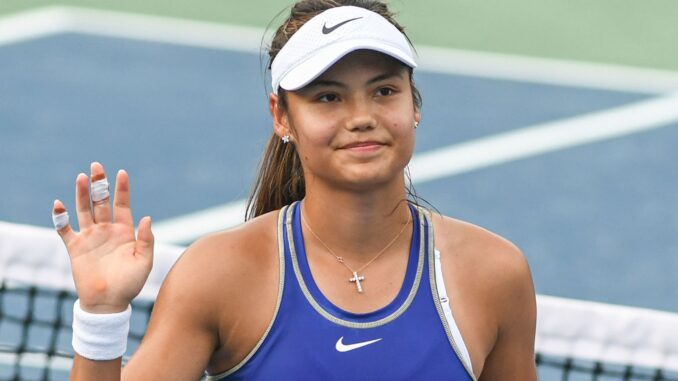
In the electrifying arena of women’s international tennis, where national pride drives every rally and roars of support fuel dreams of victory, Great Britain’s Billie Jean King Cup team is crafting a saga of grit and unity. Missing their world No. 1, Emma Raducanu, whose meteoric 2021 US Open win made her a British tennis icon, the squad is poised for history at the 2025 Finals in Shenzhen, China. Captain Anne Keothavong, a savvy leader with a player’s fire, has rallied her team with bold confidence: they have a “real shot” at claiming Britain’s first-ever Cup title. Far from a story of absence, this is a testament to collective strength—a resilient crew turning Raducanu’s absence into a stage for shared brilliance, showing that true champions thrive against the odds.
The Billie Jean King Cup, renamed in 2020 to honor a pioneer of equality, is a crucible where individual stars unite for national glory. Seeded second, Great Britain arrives battle-tested, having reached the semi-finals in 2023 and 2024, only to fall to Italy last year. Raducanu was pivotal then, delivering three perfect singles wins with her fierce forehands and relentless court coverage. This time, she opted out, choosing a wildcard entry into the WTA 500 Korea Open to chase ranking points and a 2026 Australian Open seeding. “It was a tough call,” Raducanu said after a hard-fought 6-3, 6-4 win over Jaqueline Cristian in Seoul, fending off 11 of 12 break points. Her second-round loss to Barbora Krejcikova coincided with Britain’s quarter-final sweep of Japan, sparking online buzz—from supportive fans to memes questioning her choice.
Keothavong, a former US Open quarter-finalist, didn’t mince words about the disruption. “Disappointing,” she said before the Japan tie, citing the late notice that forced a lineup reshuffle. Raducanu’s absence echoed her February skip of qualifiers in The Hague for a Los Angeles training block, leaving others to secure victories over Germany and the Netherlands. Yet Keothavong’s faith never wavered. “We’re second seeds with semi-final runs behind us—we’ve got a real shot,” she asserted, her words a blend of defiance and belief in her team’s proven grit.
Leading the charge is a tenacious quartet. Katie Boulter, Britain’s No. 1 at world No. 55, has seized the spotlight with ferocity. The 29-year-old from Leicester, who briefly lost her top domestic ranking to Raducanu, unleashed a 6-3, 6-1 rout of Japan’s Ena Shibahara in 70 minutes, her precise groundstrokes and sharp net play dominating. “Emma’s absence stings, but this is our chance to shine,” Boulter said, her resolve clear. Sonay Kartal, a 23-year-old rising star with Turkish-British roots, dazzled at No. 52, fresh off a WTA 125 title in Tunisia. She crushed Mai Hongo 6-2, 6-3 in 85 minutes, converting five of seven break points with aggressive baseline play. “This is unfinished business,” Kartal said, referencing last year’s near-miss.
The team’s depth sparkles with Jodie Burrage and Francesca Jones. Burrage, a 25-year-old lefty with a powerful serve, brings doubles strength after breaking the top 100. Jones, a 24-year-old wildcard from Bromley, adds fearless grit despite a tough 2025, her Nottingham upset of Petra Kvitova a highlight. Named as a late replacement, Jones embodies the squad’s adaptability. “The girls are ready to step up,” Keothavong said, praising their Shenzhen unity—shared meals, strategy huddles, and vision boards forging a tight-knit front.
This semi-final run flips the narrative around the Cup’s September slot, which clashes with the Asian WTA swing. Absences like Raducanu’s and Naomi Osaka’s underscore the tension between team duty and personal goals, yet Britain’s success proves a team can thrive without its star. Now, they face a formidable United States in the semi-finals on September 20, 2025, with Coco Gauff, Jessica Pegula, and Danielle Collins bringing athletic firepower on Shenzhen’s clay. Boulter and Kartal’s flawless 4-0 singles record this Finals fuels upset hopes, with Burrage and Jones potentially pivotal in doubles.
For Keothavong, this is a personal quest. Britain’s four runner-up finishes—1967, 1971, 1972, and 1981—linger as near-misses, the title elusive. “It’s about giving your all when it matters,” she told her team, echoing Raducanu’s Seoul mindset. As BBC streams capture the action, this isn’t about who’s absent but who’s rising. With the trophy in sight, Great Britain’s chorus of heart, hustle, and hope grows louder—proof that glory is a team symphony, ready to resonate worldwide.
Leave a Reply